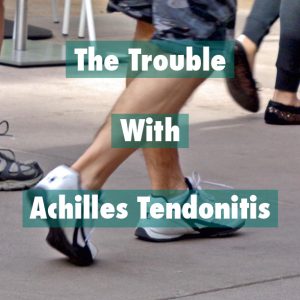Achilles tendinitis in an overuse injury of the band of tissue that connects calf muscles at the back of the lower leg to your heel bone. This tendon is known as the Achilles tendon, which allows you to push your foot down and is utilized as you walk, run and jump.
The injury occurs when the tendon becomes swollen and painful near the bottom of the foot. Over time, this condition can produce a covering of scar tissue, which is less flexible than the tendon. If the inflamed Achilles continues to be stressed, it can tear or rupture.
Causes
Achilles tendinitis is usually not related to a specific injury, but instead commonly results from repetitive stress to the tendon. It occurs most often in walkers, runners or other athletes as the condition can be brought on by not stretching the calves properly, increasing running mileage too quickly or simply overtraining.
The structure of the Achilles tendon also weakens with age, which can make it more susceptible to injury. This means that weekend warriors, who rarely workout and participate in competitive sports sparingly, are at an increased risk for injury.
In older adults, one of the more common causes of Achilles tendinitis is arthritis. A bone spur or growth may form in the back of the heel bone, which in turn irritates the Achilles tendon and causes pain and swelling.
Symptoms
The pain associated with Achilles tendinitis is characterized by dull or sharp pain anywhere along the back of the tendon, but usually close to the heel. It typically begins as a mild ache after running or other sports activity and gets progressively worse during prolong physical activity.
Other signs you might have Achilles tendinitis include limited ankle flexibility, redness or heat over the painful area or a buildup of scar tissue that can be felt on the tendon.
You might also experience tenderness or stiffness, especially in the morning, which usually improves with mild activity.
Treatment
The first thing to do is to cut back your training. If you start experiencing Achilles pain, stop running. Take aspirin or ibuprofen, and ice the area for 15 to 20 minutes several times a day until the inflammation subsides. Self-massage may also help.
If over-the-counter pain medications aren’t enough, your doctor might prescribe stronger medications to reduce inflammation and relieve pain.
Achilles tendinitis usually responds well to self-care measures, but if your signs and symptoms are severe or persistent, your doctor might suggest other treatment options. In most cases, nonsurgical treatment options will provide pain relief, although it may take a few months for symptoms to completely subside.
Prevention
While it may not be possible to prevent Achilles tendinitis, you can take measures to reduce your risk:
- Increase your activity level gradually: If you’re just beginning an exercise regimen, start slowly and gradually increase the duration and intensity of the training.
- Wear proper shoes: The shoes you wear while exercising should provide adequate cushioning for your heel and should have a firm arch support to help reduce the tension in the Achilles tendon. Avoid wearing worn-out shoes as they typically no longer provide adequate support for your feet. If regular shoes don’t work, a podiatrist can called upon to craft a custom-made orthotic insert.
- Don’t forget to stretch: Always remember to stretch your calf muscles and Achilles before and after exercising to maintain flexibility.
—
Follow Delray Beach Podiatry on Twitter @Delray_Podiatry
The content on this website is for informational purposes only. Do not rely or act upon information from www.DelrayBeachPodiatry.com without seeking professional medical advice. If you live in South Florida and would like a consultation with Dr. Ian Goldbaum, a podiatric physician and surgeon with over 30 years of experience, please see our contact information below:
BOCA/DELRAY
16244 S. Military Trail #290, Delray Beach, FL 33445
561-499-0033
BOYNTON BEACH
8198 Jog Road #100, Boynton Beach, FL 33472
561-499-0033


No responses yet